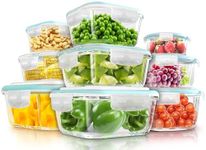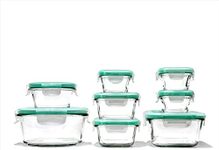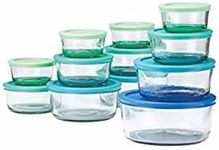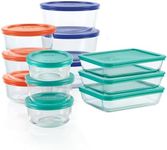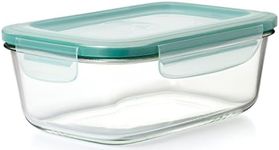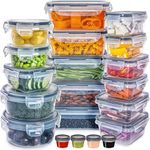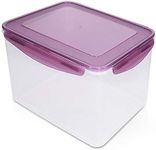Buying Guide for the Best Glass Containers
Choosing the right glass containers can make a big difference in how you store, organize, and even serve your food. Glass containers are popular because they are durable, reusable, and don't absorb odors or stains like some plastics. When shopping for glass containers, it's important to think about what you'll use them for—meal prep, leftovers, pantry storage, or even baking. Understanding the key features will help you pick containers that fit your lifestyle and make your kitchen more efficient.Capacity/SizeCapacity refers to how much a container can hold, usually measured in milliliters, ounces, or cups. This is important because the right size ensures you can store the amount of food you need without wasting space. Small containers (under 500ml) are great for snacks, sauces, or baby food. Medium sizes (500ml to 1 liter) work well for single servings or side dishes, while large containers (over 1 liter) are best for family meals or bulk storage. Think about your typical portion sizes and what you plan to store to choose the right mix of sizes for your needs.
Lid Type and SealThe lid is what keeps your food fresh and prevents leaks. Some lids snap on, while others have locking mechanisms or silicone gaskets for an airtight seal. Airtight lids are best for keeping food fresh longer and preventing spills, especially if you plan to transport your food. If you mostly store dry goods or use the containers at home, a simple snap-on lid may be enough. Consider how often you'll be moving the containers and whether you need leak-proof protection.
ShapeGlass containers come in various shapes, such as round, square, or rectangular. The shape affects how efficiently you can store them in your fridge, freezer, or pantry. Rectangular and square containers usually stack better and make the most of shelf space, while round containers are easier to clean and good for liquids or salads. Think about your storage space and what types of food you usually store to decide which shapes will work best for you.
Material QualityNot all glass is the same—some containers are made from regular glass, while others use borosilicate glass, which is more resistant to temperature changes and less likely to crack. If you plan to use your containers in the oven or freezer, look for borosilicate glass for extra durability. For everyday fridge or pantry use, regular glass is usually sufficient. Consider how you'll use the containers to decide if you need the extra strength of borosilicate glass.
Microwave/Oven/Freezer/Dishwasher SafetyMany glass containers are safe for use in the microwave, oven, freezer, and dishwasher, but not all are. This feature is important if you want to reheat food, bake, or freeze leftovers directly in the container. Always check the manufacturer's instructions to be sure. If you want maximum convenience, look for containers that are safe for all these uses, but if you only plan to store food in the fridge, this may be less important.
Stackability and NestingStackability refers to how well containers can be placed on top of each other, while nesting means they fit inside each other when empty. These features help save space in your kitchen. If you have limited storage, look for containers that stack securely and nest compactly. If space isn't an issue, this may be less of a concern, but stackable and nesting containers generally make organization easier.
![[5-Pack] Airtight Glass Containers](https://images-proxy.bestreviews.guide/-mW21wn24cJowX7Oz5sL66XahgU=/0x150/https://m.media-amazon.com/images/I/5115VWeAwGL._AC_CX679_.jpg)

